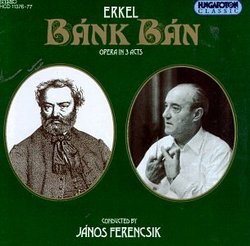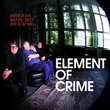| All Artists: Andras Farago, Andras Rajna, Gyorgy Melis, Laszlo Palocz, Sandor Solyom-Nagy, Ferenc Erkel, Janos Ferencsik, Ida Tarjani Toth, Erszebet Komlossy, Budapest Philharmonic Orchestra, Karola Agay, Imre Joky, Jozsef Reti, Jozsef Simandy Title: Ferenc Erkel: B�nk B�n Members Wishing: 0 Total Copies: 0 Label: Hungaroton Release Date: 4/13/1994 Album Type: Import Genre: Classical Style: Opera & Classical Vocal Number of Discs: 2 SwapaCD Credits: 2 UPCs: 750582143922, 5991811137625 |
Search - Andras Farago, Andras Rajna, Gyorgy Melis :: Ferenc Erkel: B�nk B�n
 | Andras Farago, Andras Rajna, Gyorgy Melis Ferenc Erkel: B�nk B�n Genre: Classical
|
Larger Image |
CD DetailsSimilar CDs |
CD ReviewsI'm Hungarian... 09/28/2003 (5 out of 5 stars) "...and this is the most famous recording of Bánk Bán, featuring the incomprable Simándy. Erkel was one of our greatest composers, who also wrote the National Anthem. Unlike a previous reviewer's opinion, Erkel's drama exceeds Verdi in many ways. I watched this and Verdi's Othello in the same day, and the two are worlds apart -- both incredibly beautiful and spectacular, but Othello pales in comparison to Bánk Bán, in plot, grandeur, etc. Especially beautiful is Track 13, Bánk lamenting the dire situation of both his wife, raped by a court noble, and his homeland, suffering under a corrupt queen. It ends with the aria "Hazám, hazám," (My homeland, my homeland), which was adopted by the nation and is now played at many official functions.The plot, in a nutshell: András II (13th century), the king of Hungary, is away in the crusades. The country is under the rule, meanwhile, of his non-Hungarian wife, Gertrud, savaging the country by her vast foreign company. She cares nothing for the country or the people, and allows some very unsavory characters in the royal court, like the evil Biberach and her lust-filled brother, Otto, who wants to seduce the wife (Melinda) of one of the country's most powerful and noble counts (Bánk), who is currently traveling on the king's business, thus leaving his wife at the court. The queen allows Otto to drug and rape Melinda. Bánk is summoned by Petur, an other count, who is so distraught over the country's affairs that he plans to dispose the queen. Bánk, although first outraged that a fellow noble would plan treason, becomes concerned when Biberach hints that Melinda is in trouble. Biberach tells Bánk where to be and when, and Bánk spies Otto kissing his wife, though he fails to see her struggling against him. He is outraged, and decides to tell Gertrud of the rebel's plot, but to take action himself if she does not try to help the country. He confronts Melinda, but forgives her when realizes her innocence. Nevertheless, Melinda slowly becomes insane over the fact that she, unwillingly though, was with another man. Bánk also meets with a poor peasant who tells him of the immense poverty and misery in the country. Bánk recognizes him as Tiborc, who saved his life from an assassin many years ago. He entrusts Melinda and his son to Tiborc and leaves to confront the queen. At the court, he tells her of all the troubles, but she insults him and brushes off his complaints. He presses the issue, and she pulls a dagger. In the scuffle, she is stabbed and dies. Biberach and Otto escape. In the final scene, András returns to find his wife dead. After a short investigation, it turns out that she was killed by his most loyal subject, Bánk. The grieving king tells him to draw his sword, initiating a duel, but just then, Tiborc enters the hall with the bodies of Melinda and her son. Melinda took her life during a storm, unable to deal with the sinful world. Bánk collapses.All in all, the finest opera to grace any stage in the world. A must-have for everyone." An amazing melodic gift Peter Czipott | San Diego, CA United States | 12/07/1999 (4 out of 5 stars) "Ferenc Erkel was the Hungarian analog of Mikhail Glinka: the founder of a national school of music. His melodic gift rivals that of Bellini, and his dramatic sense is worthy of comparison to early Verdi. Bank Ban is packed with music that would become greatest hits, but for the isolation forced by its Hungarian-language text. The performance is first-rate; Ferencsik was a masterly conductor and most of the singers are world-class. Alas, Jozsef Simandy, a great heroic tenor, was well past his prime when the recording was made, and his singing is often effortful. But don't let this fact deter you from trying out this masterpiece, relegated by language to undeserved neglect." Belcanto with a touch of paprika Peter Czipott | 08/17/1999 (5 out of 5 stars) "Widely unknown, this opera, Hungary's national opera, is a masterpiece of Belcanto. Too sad that the Hungarian language seems too hard to sing ouside the Budapest National Opera...but it's that language that gives this outstandingly beautiful music a special taste of exotism. Maybe it's worth a trip to Budapest to see this gem of an opera on stage - this brilliant recording promises a lot!"
|

 Track Listings (15) - Disc #1
Track Listings (15) - Disc #1
